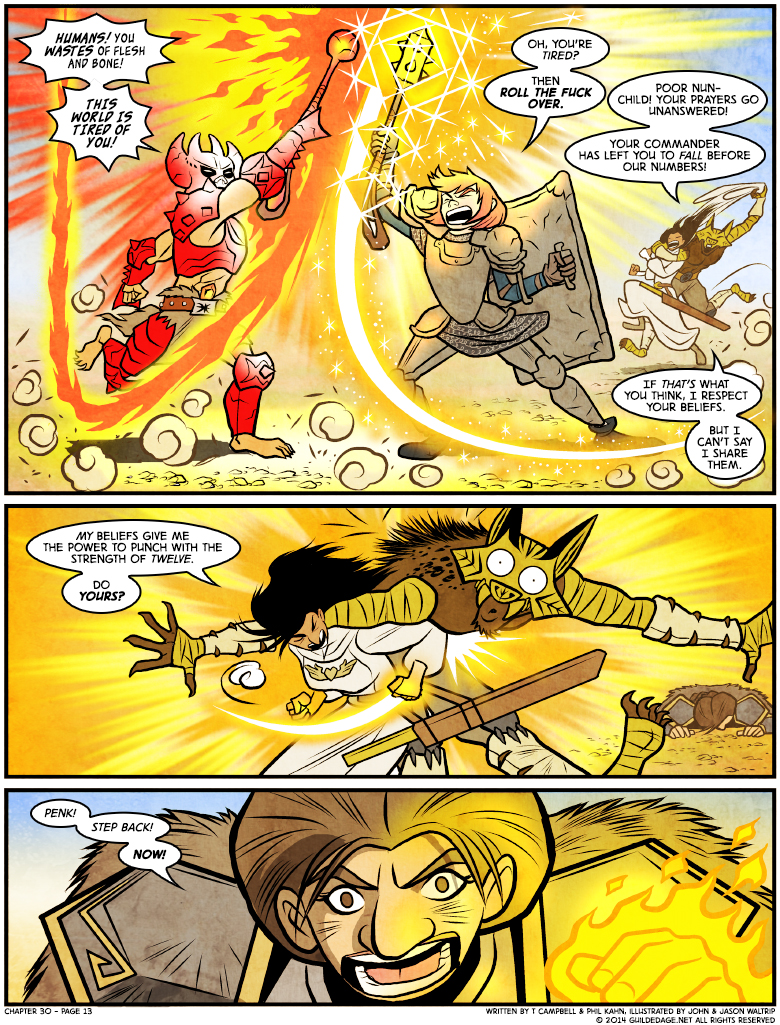Annotated 30-13
So I guess it’s time to make this official. Phil identified as male throughout the production of Guilded Age, but “she/they” are the nominative pronouns that she now uses. I’ll be going with “she” going forward, even when describing interactions with her in the days we were making these pages. One caveat: I can’t promise I won’t slip up occasionally: fourteen years of habit is a lot to unlearn!
Hahaha that second panel. Sorry, Auraugu, but you know how it goes: sometimes you’re the face, sometimes you’re the heel, and sometimes, sometimes, you’re the jobber.
Though we seem to be establishing the Champions as defined by persistence as much as might. Here’s Magda in frames 2 and 3, knocked down, seemingly out, but then getting… back… up, as Auraugu and Penk also have, whereas Syr’Nj gets carried off the field and another Peacemaker’s about to get an injury they can’t shake off.












Well hey, congrats to Phil!
I get knocked down
But I get up again
And you’re never gonna keep me down
So that now makes FOUR OG webcomics pioneers leveling up their genders at once! Congrats, Phil
(Mentioning their comics because I don’t know/can’t remember their new names yet) Are you talking of Real Life, Goblins, and Dresden Codak’s authors?
Mae Dean of Real Life, Jodie Troutman of Sporkman and Carol, and Jackie Lesnick of Girly and Cute Wendy were the ones I was thinking of. All in 2020, and all folks whose webcomics careers go back to the turn of the century
Also Grace Crowley, of Magellan.
I predict/hope that in a generation or so, we’ll have worn down the binary normativity so far that people won’t even have to declare a preference if they don’t feel like it.
That would/will be truly good for all of us, even those of us who don’t feel the chafing of the norms imposed on us.
But for now, the work is being done by correcting the mistakes of culture, openly and courageously.
Does she have a new name?
She answered that question in the comments on the previous comic: no, still Phil.
Yeah, I’m often upset by gender norms. They very so wildly based on time and place because they’re totally arbitary inventions, and yet we’re generally expected to conform to them.
That does mean there’s a wealth of tradition to be inspired by, though, so I’m happy for my binary brothers and sisters both cis and otherwise. Congratulations, Phil!
I’m definitely in the pool of folks who are tired of the binary, can acknowledge others find belonging in it, and generally am uncomfortable being gendered – not merely because people tend to want to hitch so many other ideas to it, and therefore burden me with them, either. That definitely doesn’t help, though.
Mistakes of culture? I don’t know if I’d cite the invention of gender as one, so much as culture’s overconfidence in its own narrow-mindedness about it, and insistence that it’s useful in all the commonly-presumed ways.
Congrats to Phil for finding some use for it in spite of that, I’d say.
I suppose it all comes down to human propensity to judge books by their covers. Even in scientific/engineering circles, I’m constantly meeting smart people who insist that the answer to some scientific/engineering question must be a category, not a quantity, even when it clearly can’t be.
As often as I’ve gotten mad about it, I think it serves a purpose, which is that it removes a lot of options from the table which you’d have to think about. Replacing a sliding scale (or worse, a set of some unknown number of variables!) by a simple binary makes it so much easier to think about stuff and reduce the number of potential scenarios to consider. The people who have a hard time making up categories spend way too long making decisions. The people who have no such issue are way more likely to finish their stuff on time. The people who have a hard time moving beyond categorical thinking, though, are the ones whose results you should not trust …
I guess the trick is to know when to use your drawers and when not to. When one pair of drawers is chiseled into the grammar of most languages on earth, that’s when it becomes really hard not to use them.
For sure we have an urge to oversimplify things for comfort, but in most cases it’s just about a lack of vocabulary.
Those overstated claims about how many words for snow the Inuit have? There’s some kernel of truth in there. We do handle ambiguity by making boxes, but there’s no rule it’s gotta be binary. We can make more boxes, y’all. Just consider, Danish people have a lot of words for pastries (as do the Wiennese), it absolutely doesn’t have to be negative to have a wide vocabulary. People react against it out of habit, not because having more accurate vocabulary is somehow hard to work with.
We have expectations of a binary specifically because our culture dictates a binary, and hasn’t got good vocabulary for all the natural variations. It’s pretty much impossible to fully remove the cultural goggles we’re fitted with. Just like a man really can’t say that his workplace doesn’t discriminate against women : He really will not be able to see most of it if it’s there, so his impression of a negative would be to be expected, even if there is discrimination.
Building a vocabulary is the first step, and that’s work in progress.
Oh, congrats to Phil.
Also it is interesting how in their first big moment in the story the Champions are really not all that triumphant, though I suppose we’re already past halfway through so it would probably be rather odd, pacing-wise, if the Champions had a more significant victory here that the Peacemakers then had to bounce back from in time for other plot points.
Does Phil use a different name now, or is “Phil” still OK?
Never mind, saw the clarification in one of the replies.